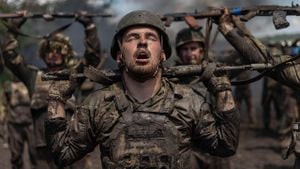The pro-Palestine protests across various U.S. universities have sparked both fervor and backlash, leading to significant legal and financial consequences for those involved. From Columbia University to UCLA, students have faced suspensions, arrests, and even heavy police presence during their demonstrations.
At Columbia University, most students who previously faced disciplinary action for participating in protests against Israel's military actions will be able to return to classes this fall. The university's handling of these protests drew criticism and led to the resignation of its president, Minouche Shafik, leaving many to question the institution's commitment to free speech and student rights.
Reports indicate approximately 40 students were initially arrested for various protests staged on campus. According to information provided by the university, only two of these students remain suspended, with the majority allowed to resume their studies.
This wave of pro-Palestinian protests began around the time of heightened conflict between Hamas and Israel, following Hamas's attacks on October 7. The protests, including the erection of tents on campus, culminated when university administration called law enforcement to clear protesters deemed to be violating campus regulations.
Many rights groups condemned the university's decision to involve police, viewing it as an affront to the very principles of expression and academic freedom. Student group Columbia University Apartheid Divest urged the school to divest from companies connected to the Israeli military, amplifying their call for human rights advocacy.
Similarly, the protests at UCLA saw substantial police intervention and considerable financial expenditure. Public records reveal the university spent over $630,000 on police overtime alone to manage these demonstrations, reflecting the intense atmosphere at campuses across the nation.
The protests at UCLA were particularly confrontational, with violent clashes between pro-Palestinian and pro-Israel demonstrators occurring during the anti-war encampments. The university enlisted the help of the Los Angeles Police Department, leading to over 200 arrests during the peak weeks of demonstration.
During one notable clash, counter-protesters reportedly attacked the encampment, prompting police to respond with riot gear and force, including chemical irritants. Observers reported the overwhelming presence of police sometimes left protesters feeling unsafe, especially when seeking help during violent altercations.
UCLA students criticized the administration's priorities, stating the rapid police response to remove them generated fear, undermining their right to protest. Protests escalated as students felt increasingly sidelined, pressured amid political tensions on campus.
Back at Columbia, some students are awaiting disciplinary hearings, which could still result in suspension or other repercussions. Approximately half of the protesting students have been placed on probation, which may affect their standing within the university.
The political ramifications of these protests echo beyond campus borders, with congressional committees examining the situations for signs of antisemitism and university negligence. The Republican-led committee criticized Columbia’s handling of protests, calling attention to its lack of serious repercussions for students involved.
A notable aspect of the protests has been discussions around hate speech and its boundaries on campus. Columbia University faced scrutiny for not charging any students with hate speech during the protests, indicating the complex nature of freedom of expression versus potential hate rhetoric.
Students leading the protests argue they are exercising their rights to free speech and assembly, particularly concerning international human rights issues. The protests have particularly illustrated the tensions between advocacy for Palestine and perceptions of antisemitism, illustrating the broader cultural conflicts occurring on campuses nationwide.
While many students express feeling empowered by their actions, others involved face challenges and potential fallout as university disciplinary processes move forward. Supporters of the protests say sanctions threaten future activism, viewing them as attempts to stifle dissent.
Looking at the broader picture, the pro-Palestine protests have ignited nationwide discussions about political protest on college campuses. This situation embodies wider geopolitical tensions and brings to the forefront how educational institutions navigate the intersection of activism, student welfare, and safety.
Public sentiment continues to fluctuate as more students return from suspensions, renewing debates over how best to handle such situations without infringing on rights. The aftermath of these protests remains to be seen, as students and universities reevaluate their roles within this complex environment.
Though the situation remains fluid, the pro-Palestine movement has made significant strides on campuses, galvanizing students and raising awareness about issues affecting Palestinians. The protests showcase the challenges universities face when managing burgeoning political movements amid heightened national and international tensions.



